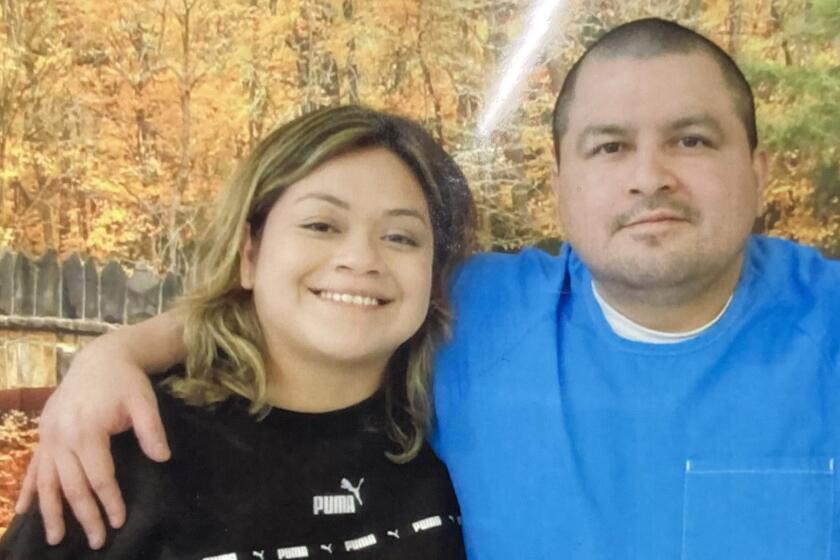They were locked up 17 years ago for a murder. L.A.’s new district attorney is setting them free

- Share via
In a dramatic courtroom scene that one wrongly convicted woman called “a Christmas miracle,” a Los Angeles County judge on Friday vacated the murder sentences of two people — 17 years after they were locked up — and ordered their immediate release.
“Those charges are dismissed,” said Superior Court Judge William Ryan, adding: “You have to understand how rare this is.”
As weeping family members and friends of Lombardo Palacios, 33, and Charlotte Pleytez, 37, looked on, the courtroom exploded in applause.
The pair were convicted in 2009 for the 2007 murder of Hector Flores, who was shot to death in his car in a strip mall off Sunset Boulevard. The two had come onto the radar of LAPD detectives after word hit the street that the killers were associated with the White Fence gang, a predominantly Latino group operating in the area, according to court records. The pair were identified by two witnesses who picked their faces out of a book of photographs of gang members. However, the shooting happened at night, and one witness had poor vision and wore trifocal lenses.
Still, a jury convicted Palacios and Pleytez, who was pregnant at the time of her arrest and later gave birth behind bars, sentencing them to 50 years to life.
In the wake of the shooting, police had pulled Palacios, then 15, out of bed and interrogated him for hours. Eventually, the teenager implicated himself in the killing — although details of what he said did not match the crime, according to descriptions of the incident included in court filings.
Palacios later recanted and in the years since has maintained his innocence.

In a letter to the Innocence Project released by his attorney, Palacios explained why he confessed to something he didn’t do. The detectives, he said, “kept repeating the story of the crime to me. I was frustrated and tired of the situation.”
Frightened and exhausted, he said, he began to agree with them.
“I took the story and placed myself in it. I said everything they wanted me to say,” he wrote.
Lombardo Palacios was 15 when he confessed to murder following hours of interrogation that employed pressure tactics many experts now say are unreliable. Seventeen years later, Los Angeles County Dist. Atty. George Gascón has asked a court to set Palacios and his co-defendant free.
His co-defendant, Pleytez, a woman a few years older whom he barely knew, has always maintained she was not involved in the crime.
Though Palacios’ interrogation was ultimately not used at trial, his lawyer, Nicolas Tomas, said the confession likely played a role in the outcome in that it gave detectives a degree of confidence that they had the right people in custody. Years later, a private investigator working for Palacios’ defense team would make a critical discovery: other suspects overlooked by police.
Armed with that new evidence, the defense team asked former Dist. Atty. George Gascón and his Conviction Integrity Unit to review the case. In October, Gascón moved to have Palacios and Pleytez declared “factually innocent.”
At the time, Gascón told The Times that he was “convinced that not only are they innocent, but we believe we might know who committed the murder.”
The motion his office filed jointly with attorneys for Palacios and Pleytez identified new suspects, though their names were redacted in court records. But the move to release the pair in October hit an unexpected twist: The original prosecutor who tried the case, Dayan Mathai, still a member of the district attorney’s office, showed up in court to protest.
Mathai’s appearance in court created an unusual situation: two prosecutors from the same office arguing for different outcomes. Mathai said he wanted to offer comment on “the credibility of some of the witnesses” who were supporting the exoneration.

Judge Ryan continued the October hearing to a later date, dashing the immediate hopes of the two defendants, as well as of family members who had gathered at the prison gates expecting their release.
In the interim, Los Angeles County voters removed Gascón from office and replaced him with Nathan Hochman. After reviewing the case, Hochman agreed with his predecessor that the pair should not be in prison.
This week, Hochman, in a brief also signed by Mathai, asked the judge to vacate their convictions.
“New evidence uncovered … has caused the LADA to lose confidence in the conviction,” he wrote.
He asked the judge to consider at a later date the question of whether the pair are “factually innocent,” which means that authorities acknowledge they did not commit the crime.
Hochman’s brief also said that the prosecutors and police officers who initially put the pair in jail had done nothing wrong.
“This newly discovered evidence was not available” at the time of the original investigation, he wrote. “There is no evidence to suggest that any of the investigating officers, responding officers, or prosecutors involved in the case acted inappropriately, unethically, or illegally.”
Forty years ago, Michael Anthony Cox was convicted of the murders of three girls in the Sierra Nevada foothills. Years later, the two main witnesses at his trial, also teenagers, recanted, saying police had pressured them into false stories. So why is Cox still on death row?
Mathai’s original opposition to the pair’s release created a moment of tension in the courtroom again Friday. Initially, the judge said he would release the pair, but only if they wore ankle monitors. He explained that he was doing so because of the concerns Mathai had raised in his October filing.
Hochman assured the judge that Mathai no longer had concerns about the pair’s release. “We’ve lost confidence in the conviction,” he said, adding: “We went through everything.”
For Pleytez, Palacios and their families, the legal intricacies paled in comparison to the fact that they were, finally, going home.
“It’s a Christmas miracle,” Pleytez told the judge. “I’m just beyond grateful.”

After the hearing was over, Pleytez’s mother presented her with a gift she will need now that she is free. “I have a phone,” she exclaimed. “My mama bought me a phone!”
Before the hearing, Palacios, too, was presented with a new phone. “This is my first time holding a phone in 18 years,” he said as his sister, Sigry Ortez, showed him how to send texts.
Before the hearing, Hochman had gathered with the families outside the courtroom, making introductions and exchanging hugs.
“This will be a good one, a good Christmas,” Hochman said to Palacios’ mother, who told him that seeing her son freed was something she had wished for during the holidays every year of his incarceration.
Palacios thanked Hochman for backing his release and added, “I knew that justice would prevail.”
More to Read
Sign up for Essential California
The most important California stories and recommendations in your inbox every morning.
You may occasionally receive promotional content from the Los Angeles Times.














